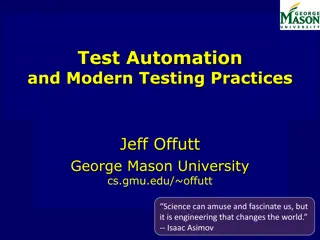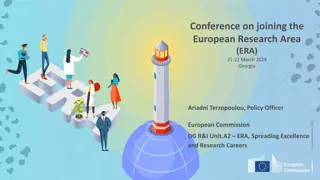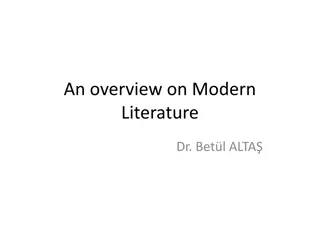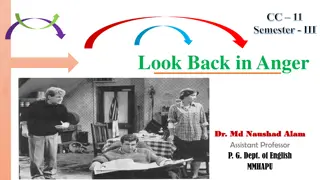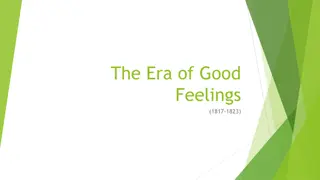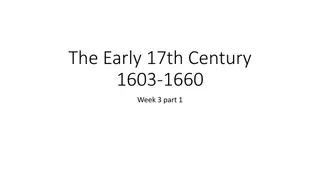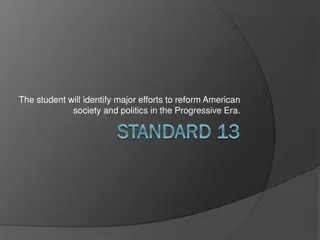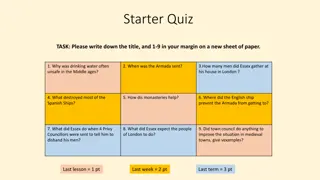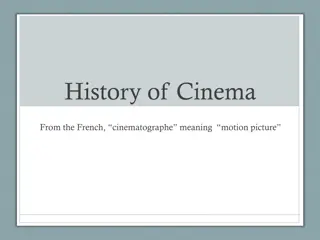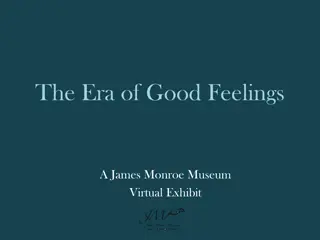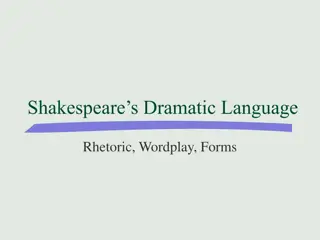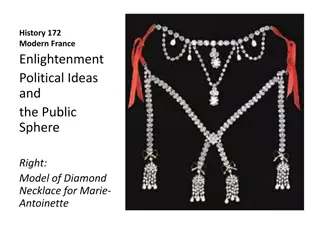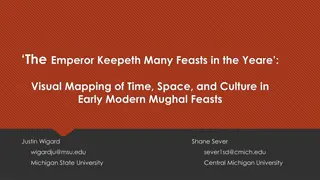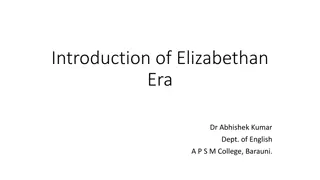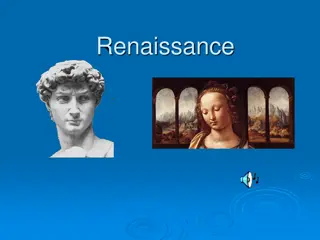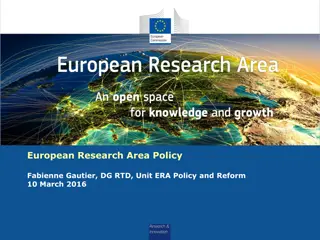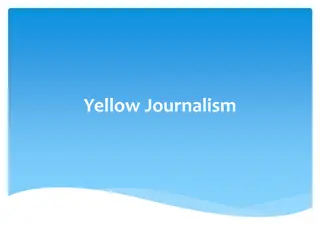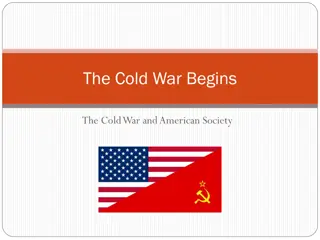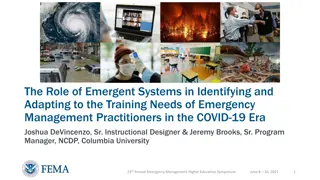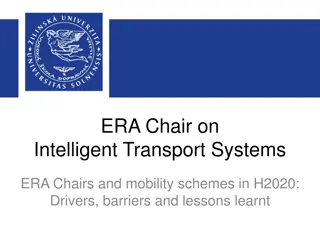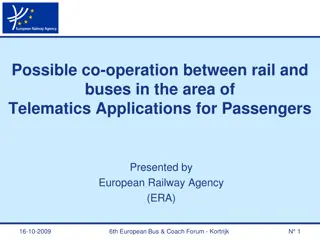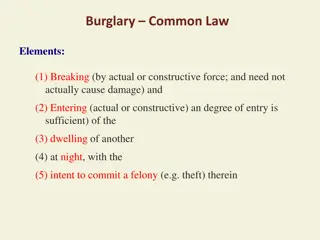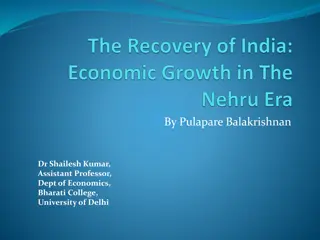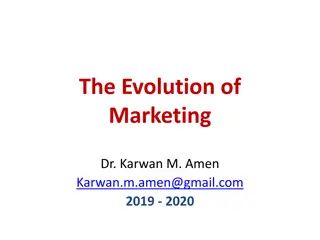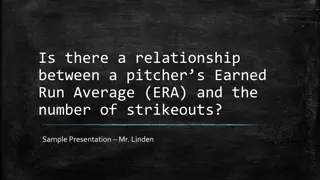Evolution of Film Adaptations: From Silent Cinema to Modern Innovations
The moving picture industry emerged in the 1890s, paving the way for adaptations of literary works in the early 1900s. With the advent of sound, a new era of adaptations began, leading to experiments and innovations in modern filmmaking. Adaptation is a process of adjusting and presenting a work in
8 views • 23 slides
Evolution of Test Automation and Modern Testing Practices
Explore the evolution of test automation and modern testing practices, from the manual testing era to the reasons for automating testing. Learn about the challenges, achievements, and takeaways in the field of test automation. Discover the importance of software testing in ensuring high-quality prod
11 views • 38 slides
Advancing the European Research Area (ERA) Towards Innovation and Excellence
The European Research Area (ERA) aims to boost research and innovation investments, enhance market uptake, and promote excellence by prioritizing certain objectives. With significant achievements in R&D expenditure and researcher growth, the ERA is focusing on deepening and broadening its impact thr
0 views • 9 slides
Evolution of Modern Literature in the 20th Century
The Modern Age in literature emerged in response to the Victorian era, marked by a shift in attitudes towards life and society. Influenced by historical, economic, and ideological factors such as World Wars, capitalism, and the disintegration of empires, Modern Literature explored new themes and sty
1 views • 14 slides
Evolution of Modern Poetry in the 20th Century
Modern poetry in English emerged in the early 20th century as a reaction to Victorian formalism. Modernists drew inspiration from diverse literary traditions, including Greek, Chinese, and Japanese poetry, to create works that depicted social changes and the impact of World War I. Themes of material
1 views • 7 slides
Evolution of Modern Drama in the 20th Century: Characteristics and Trends
Modern drama in the 20th century experienced a revival and various trends. Realism was a significant quality where dramatists like Ibsen focused on portraying real problems of life. Problem plays emerged, addressing societal issues like marriage and justice. Modern drama shifted towards being a stag
1 views • 14 slides
Evolution of Jazz Dance: From Origins to Modern Trends
Explore the fascinating history of jazz dance, from its African-American roots and early dancers like Jack Cole and Katherine Dunham to how it has evolved over the years. Discover the influence of ballet, tap, and modern dance on jazz, along with changes in footwear, clothing, and choreography. See
2 views • 8 slides
Guide to Tackling Modern Slavery in Leeds
The Leeds Pledge to Tackle Modern Slavery offers a comprehensive guide for individuals and organizations in Leeds to combat modern slavery effectively. Launched on Anti-Slavery Day, this guide covers key sections like Recognize, Report, Support, Prevent, and Raise Awareness, providing information, r
0 views • 33 slides
Exploring John Osborne's Look Back in Anger: A Modern Classic Drama
Look Back in Anger, a seminal play by John Osborne, delves into themes of alienation and identity in post-World War II England. The play's protagonist, Jimmy Porter, embodies the disillusionment and rage of the era, challenging societal norms and class struggles. Osborne's work revolutionized Englis
0 views • 9 slides
The Victorian Age: England's Era of Expansion and Industrialization
England experienced significant growth and transformation during the Victorian Age (1830-1901). The period marked a shift to a modern urban economy, industrialization, and imperial power. London emerged as a pivotal city, and England became a global powerhouse through trade and colonization. Despite
0 views • 20 slides
Understanding the Theory of Firms: Neoclassical vs. Modern Approaches
The theory of firms is explored through the Neoclassical and Modern perspectives. Neoclassical theory focuses on profit maximization, while Modern theory delves into managerial, principal-agent, and transaction cost theories. The discussion covers criticisms of Neoclassical theory and the essential
1 views • 79 slides
Modern Period of Indian History: From Mughal Decline to Independence
The modern period of Indian history began in the 18th century after Aurangzeb's death, marked by British colonization and the struggle for independence led by key figures like Gandhi. Sources like British documents, books, and speeches provide insights into this transformative era.
0 views • 11 slides
History of Extension Education and Development in India
This detailed content outlines the history and evolution of extension education and development in India, from early initiatives by outstanding individuals to the establishment of agricultural research institutions and the implementation of various schemes for rural reconstruction. It covers key sta
0 views • 15 slides
The Era of Good Feelings and Westward Expansion in Early 19th Century America
The Era of Good Feelings (1817-1823) marked a period of national unity and political agreement in the United States, leading to a focus on expansion and development. This era saw significant diplomatic achievements and a surge in westward migration, particularly to areas like the Old Northwest and O
0 views • 19 slides
Literature and Historical Events in the Early 17th Century
Queen Elizabeth's death, James I's reign, Charles I's civil war, and Cromwell's era marked the early 17th century. Major literary works by Donne, Jonson, and Bacon flourished, reflecting the social and political turmoil of the time. Jacobean writers like Herbert and Marvell emerged, paving the way f
6 views • 7 slides
Evolution of Optical Technology: From Telegraph to Photonic Integrated Circuits
The journey of optical technology evolution spans from the invention of the telegraph in 1836, through the introduction of optical fibers in 1978, to the development of photonic integrated circuits in the present era. Key milestones include the advent of optical amplifiers in 1990, the emergence of
0 views • 70 slides
History of Chemotherapy: From Empirical Use to Modern Era
The history of chemotherapy is divided into three phases, starting from the empirical use of compounds in ancient times to the modern era marked by targeted drug development. Ehrlich's pioneering work in the late 19th to early 20th centuries laid the foundation for understanding the selective toxici
0 views • 15 slides
Efforts to Reform American Society in the Progressive Era
Major reform efforts in the Progressive Era included Upton Sinclair's expose of the meatpacking industry in "The Jungle," resulting in federal oversight. Women played a significant role in reform movements, with Jane Addams establishing Hull House to aid immigrants. The era also saw the rise of Jim
0 views • 34 slides
Impact of the Renaissance on Medicine in Early Modern Britain
In the early modern period in Britain from 1450 to 1800, the Renaissance brought about significant changes to medicine. This era marked a rebirth in Europe with increased interest in classical architecture, art, and scientific advancements. The impact of the Renaissance on medicine included the chal
9 views • 8 slides
Evolution of Motion Pictures: From Early Visual Forms to Modern Cinema
Explore the fascinating history of cinema, tracing back to the 17th and 18th centuries with lantern slides leading to the proliferation of visual forms in the 19th century. Discover how the industrial era ushered in books of photographs and illustrated fiction, catering to the middle and working cla
2 views • 43 slides
Virtual Exhibit: The Era of Good Feelings - James Monroe Museum
Explore the virtual exhibit showcasing James Monroe's presidency, known as the Era of Good Feelings, a time of nationalism and political unity in the United States. Discover different aspects of Monroe's terms, from politics to treaties, to evaluate the era's significance.
0 views • 23 slides
Exploring Shakespeare's Dramatic Language and Themes
Shakespeare's dramatic language entails rhetoric, wordplay, and rich forms that offer both pleasure and challenges to readers. His verse showcases density and richness, with characters expressing thoughts through powerful metaphors and figurative language. Examples from "Macbeth" illustrate how imag
0 views • 40 slides
Enlightenment Political Ideas in Modern France
The Enlightenment era in Modern France brought forth significant political ideas and discussions, including Thomas Hobbes' concept of social contract and Rousseau's emphasis on collective sovereignty. Montesquieu advocated for checks-and-balances in government, while Voltaire promoted enlightened ab
0 views • 21 slides
Evolution of Human Rights: From Ancient Times to Modern Era
Throughout history, ideas of rights and liberty have evolved, leading to the recognition of universal human rights in the modern sense. The concept of human rights can be traced back to significant historical events such as the English Bill of Rights, the Virginia Declaration of 1776, and the French
0 views • 7 slides
Mapping Time and Culture: Mughal Feasts in Early Modern Era
Visual mapping of Mughal feasts in the early modern era provides insight into the historical and cultural connections between Eastern and Western memoirs. By analyzing the role of feasts in a connected history, this project applies a quantitative and visual approach through digital humanities to und
0 views • 11 slides
Insight into the Elizabethan Era: Queen Elizabeth's Reign
The Elizabethan Era under Queen Elizabeth's reign marked a transformative period in England, characterized by a shift from darkness to light in various aspects of English life. Queen Elizabeth's dedication to England and her inspiring patriotism brought about unity and national greatness, amidst rel
0 views • 9 slides
The Renaissance: A Period of Innovation and Transformation
The Renaissance period marked a significant shift in European history, bridging the gap between the Middle Ages and the modern era. It was characterized by a renewed focus on humanism, art, education, and science, leading to groundbreaking developments in various fields. This era saw the rise of pri
0 views • 31 slides
Importance of ERA in Advancing European Research Area Policy
The European Research Area (ERA) is crucial for enhancing EU's role in R&D policy, meeting higher R&D expectations, promoting national research systems, enabling transnational cooperation, fostering gender equality, and facilitating knowledge transfer. The ERA Roadmap outlines priorities such as eff
0 views • 15 slides
The Legacy of Yellow Journalism: Joseph Pulitzer and the New Era of Press
In the early era of the press, yellow journalism emerged as a colorful and sensational form of news reporting, popularized by publishers like Joseph Pulitzer and William Randolph Hearst. Pulitzer, an immigrant to America, championed accuracy and public causes through his newspapers, such as the St.
0 views • 15 slides
Evolution of Criminal Law and Thought: From Pre-Classical Era to Enlightenment
Explore the progression of criminal law and thought from the Pre-Classical School of Thought to the Enlightenment era. Delve into concepts like folkways, mores, and the origins of criminal law, including examples such as societal norms, dress codes, and supernatural explanations for behaviors during
0 views • 23 slides
The Impact of the Red Scare and McCarthyism on American Society
The Cold War era saw the rise of the Red Scare and McCarthyism in America, fueled by fears of Communist infiltration. The loyalty review program, House Un-American Activities Committee, and infamous cases like Alger Hiss and the Rosenbergs reflect the intensity of the anti-Communist hysteria. Joseph
0 views • 12 slides
Emergent Systems for Training Needs in COVID-19 Era
Explore how emergent systems can identify and adapt to the training needs of emergency management practitioners during the COVID-19 era. The symposium delves into analyzing feedback from pandemic-era trainings, aligning emergent themes with national preparedness assessments, and offering recommendat
0 views • 11 slides
Advancing Intelligent Transport Systems Through ERA Chair Program
The ERA Chair program focusing on Intelligent Transport Systems (ITS) has significantly impacted research and innovation at the University of Zilina. Driven by key personnel like Dr. Karl Ernst Ambrosch, Dr. Dietrich Leihs, and Prof. Tatiana Kovacikov, the initiative has led to enhanced internationa
0 views • 19 slides
European Railway Agency's Role in Promoting Cooperation between Rail and Buses in Telematics Applications
The European Railway Agency (ERA) plays a crucial role in enhancing cooperation between rail and buses through Telematics Applications. Established in 2004, ERA focuses on recommending legislation, ensuring interoperability, and enhancing safety in the European rail network. Recommendations made by
0 views • 17 slides
Understanding Burglary and Arson Laws: Common Law vs. Modern Rules
Burglary and arson laws have evolved from common law principles to modern statutes. In common law, burglary involves breaking and entering a dwelling at night with intent to commit a felony, while arson requires malicious burning of another's dwelling. Modern laws may vary, eliminating some elements
0 views • 6 slides
English Poetry Development from Shakespeare to Contemporary India
Explore the rich tradition of English poetry from Shakespearean era to modern India through various literary movements. Delve into Elizabethan, Metaphysical, Romantic, Victorian, Modern English, and Modern Indian English poetry with critical analysis to appreciate the evolution of poetic forms and t
0 views • 5 slides
Quality of End-of-Life Care for Vietnam-Era Veterans: A Retrospective Analysis
This study examines the quality of end-of-life care for Vietnam-era veterans compared to veterans of prior war eras. Data analysis includes clinical characteristics, healthcare utilization, and quality indicators from bereaved family members of deceased veterans. The research highlights the unique c
0 views • 28 slides
Exploring the Nehru Era: Growth Patterns and Economic Strategies
Investigate the growth patterns during the Nehru Era (1950-1964), highlighting the different views on its impact, including the Nehru-Mahalanobis model and Vakil-Brahmananda plan. The era saw debates on whether it was a wasted period or a period of growth due to factors like growth transition and st
0 views • 15 slides
Evolution of Marketing in Healthcare: A Historical Perspective
The evolution of marketing in healthcare has been significant, with the concept taking several decades to evolve. From the production era to the sales era and now the marketing era, hospitals have shifted their focus from quality products to attracting patients through various strategies. This prese
0 views • 16 slides
Exploring Pitcher's ERA and Strikeout Relationship in Baseball
An analysis was conducted to investigate the relationship between a Major League pitcher's Earned Run Average (ERA) and the number of strikeouts during the 2018 regular season. Using a simple random sample of 30 pitchers, a correlation coefficient of -0.376 was found, indicating a moderately weak ne
0 views • 10 slides

